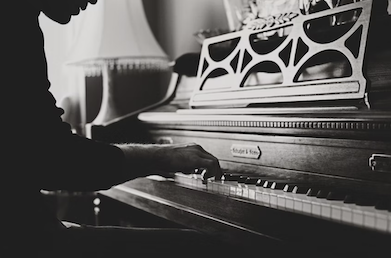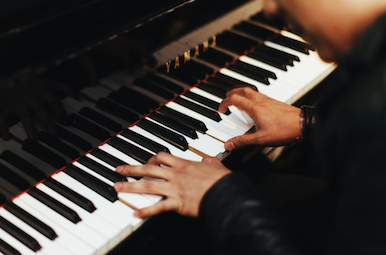A Beginner's Guide On How To Play Piano
2022.02.17
When you think about popular musicians like Billy Joel or Elton John, one might very easily imagine that these people were incredibly talented children from day one. In reality, this is anything but the case. Many of these people were actually once beginners, and practiced for hours a day to get where they are today.

This article will teach you how you can become a beginner at playing piano as well. It will also teach you basic playing techniques, and give you some advice on what to do when you're just starting out. Here is a guide to follow as a beginner on how to play piano.
Why Do You Want To Play Piano
Before learning how to play the piano, you should have a clear understanding on why you want to learn it. Learning something new is not an easy task and will take up a lot of your time, so before learning, make sure that what you are doing is for the right reasons; because if you don't enjoy or lack interest in playing this instrument, then you might find yourself struggling and quitting. It is important to take some time and think of the reason as to why you want to play the piano as it will help you stay focused and motivated. Once you have a clear understanding of why it is that you want to learn how to play piano, then you can begin learning some basics on how to read notes, practicing the different chords and scales that you would be familiar with. You will also be more inspired to learn some songs you like and would enjoy playing for someone else.
Finding The Right Piano Teacher/Mentor
As with learning any instrument, having a great teacher can make or break your experience. Finding the right teacher is not an easy task as it may take some time and a little bit of research to find a teacher you are comfortable with. While most people may be fine with just finding a random teacher, if you are really serious about learning the piano, then it is in your best interest to find someone that is qualified in teaching beginners how to play. It would be beneficial for you in the long run as it will save you time and frustration from struggling and trying to figure out the pieces on your own. This will also help you understand the basics better, have a clear understanding of what to expect, and know the right questions to ask before signing up.

Start With a Free Online Tutorial Video
The first thing you should do if you want to learn to play the piano is to find a good tutorial video online. There are plenty of websites out there that offer great tutorials for free! Not only will they teach you the basic notes and how they sound, but also how to read sheet music. Everything you need to know for your first time playing. Plus, the video will help you get acquainted with the instrument. You should also inform your teacher who will be able to correct your form. However, if you are looking for more in-depth tutorials, consider buying some online courses on the topic. With enough experience and dedication you can get pretty far! Just remember that even though it is important to practice every day, it is also important to relax and chill out every now and then.
Get an Electronic Keyboard/Piano
The next step is to actually get an instrument. If you are on a budget, an electronic keyboard or piano is the way to go. You can usually find some pretty cheap ones at local music stores or websites. When you buy online however, you will probably have more options available for customization. For example, if you live in an apartment, you can reduce the volume of your piano as low as necessary (with headphones, for example). The only downside is that it will still sound like a piano. If you are looking for something more authentic that won't cost you a fortune, consider getting a used acoustic one second-hand. Piano ownership has its perks! You can paint it, change the key color or design, or just leave it black if that's what you prefer.
Master Your Home Keys
The First important thing to remember is that simply because you cannot use all ten fingers at once, you are not limited to playing with just four fingers. There are several techniques which allow for more advanced playing styles. However, before talking about other methods of playing the piano, I feel it's necessary to master the home keys first. The home keys are covered in the following diagram.
The names of each note are shown at the top, with the key number next to it. The notes that fall on both ends of the keyboard are known as octaves. The black keys are named either sharp or flat based on how they compare to the white key directly to their left. For example, the flat key next to C is named B-flat. The safest way to play any new song on piano, even if you know it on guitar, is to first locate your home keys. This will make sure that the notes come out correctly every time!
Get It Together with Chords
If you are doing classical music, this is the ONLY way to go. If you want to play anything else (pop, rock) then it's not really necessary nor recommended. Understanding scales and chords will enable your ability to read sheet music (and therefore learn new pieces of songs). I recommend learning basic major and minor chord shapes. Practice chord changes using the easiest, most common keys (C major, G major, F major).
These are the keys found on digital pianos and keyboards (and some organs). These are also the easiest keys to label on sheet music. When doing this, it will be good practice to always think of the chords in terms of their "home" notes (i.e., where they belong). On a piano, these would be white keys only (the outermost ones). Memorizing the order of major and minor chords will help you find these home notes. For example, a C chord is made up entirely of white keys from the second one from the left (the B) to the far right end (C). A G chord would be all white keys starting from middle C going outwards, etc.
Finally, find out what you like to play most and start there. I don't recommend jumping around too much because it's important to develop a good sense of rhythm, timing, and note accuracy. It takes time but with practice even people who are completely new to the piano can enjoy playing their favorite songs! Practice every day if possible, alternating short sessions with breaks is fine) and you'll notice improvements in no time.
More Articles
Copyright © Fooyoh.com All rights reserved.